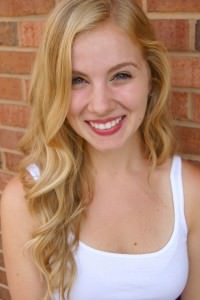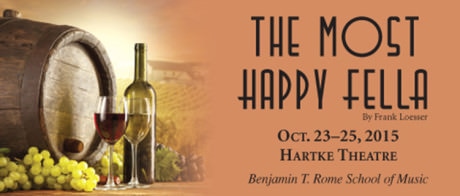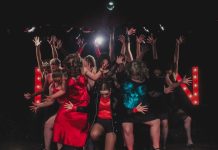In Part 2 of a series of interviews with the cast of The Most Happy Fella, meet Emma Nadine Onasch, who plays Rosabella in their upcoming production, which plays this weekend October 23-25, 2015.

Joel: Introduce yourself to our readers and tell them where they may have seen you perform on the stage or in other local venues.
Emma: My name is Emma Onasch. I’m a senior Musical Theatre Major from Portland, Oregon. I’ve honestly been off the radar in DC for a while. I spent my last semester abroad at the London Dramatic Academy, and during the summer I was home working on Doubt by John Patrick Shanley as Sister James. The last projects in DC you may have seen me in were Carousel last fall and The Frank Loesser Review at The Kennedy Center on the Millennium Stage.
Why did you want to be in The Most Happy Fella at CUA? What did you sing at your audition?
I am obsessed with the score. It’s so so beautiful, and I’ve been intrigued by the story since I was introduced to it in 2013. The plot line is a doozy, but I saw it as a wonderfully challenging opportunity, no matter which role I filled. I sang “ from The Music Man for my audition!
Who do you play in The Most Happy Fella and how do you relate to him or her? What do you admire about your character and what do you not admire?
I play “Rosabella” (whose real name is Amy…spoiler alert!) She’s not your typical ingénue. Though her best friend Cleo lovingly refers to her as a “dream girl,” she isn’t flighty. She’s strong willed and forward about what she wants. And that gets her into some trouble. But I love her for that. She really reflects the first wave of feminism that this play’s context sits in, and she’s true to her self weather she’s mad or overwhelmingly in love. She wears her heart on her sleeve and allows herself to be vulnerable when it counts, and in that vein I have really found a connection between the two of us. I can’t tell you the number of times I’ve shared tears with Amy because of what she’s gone through. She faces a lot of challenges, but she also never lets them get the best of her, and I think that’s one of her best qualities. She’s grounded and cautious but never jaded, and she’s always hopeful.
Which character that you are not playing is most like you and how and why?
I find a lot of common ground with Herman. Not so much in the whole “Standing on the Corner” vein, but rather in his genuine love of people. I’m also pretty non-confrontational, so I think I would also be pretty shocked if I made a fist. Haha. We also both love our hometowns, and though Dallas and Portland are two completely different animals, the sentiment still rings true.
How would you describe the score that Frank Loesser has written for this show?
This score is delicious! It has so many beautiful, complex textures. I think it has a little bit of something for everyone. I, for one, have never been musically bored.
What is your favorite song that you are not performing and why?
Mamma, Mamma is one of my favorites. It’s such a genuine moment of joy. Even though the lyrics are specific to Tony, the song still encapsulates that beautiful next step in any relationship. That moment where you step back and say: “Wow, I’ve found my person. A companion and friend I can really build a future with. This is really beautiful.”
What have been the challenges you have encountered while preparing for your role and how were those challenges overcome?
When you really look at this production, it almost seems like Amy/Rosabella are two different people. Amy’s this fiery waitress we meet at the top of the show, stuck in a rut in a city she wants to escape. Meanwhile, Rosabella lives in the throws of a passionate, invigorating love in a fantastic new setting. The easy choice with this character is to go with that firey image or that demure image and to carry it though the production. My challenge has been marrying the two. Finding the moments when she softens, and allows herself to be the “Rosabella,” Napa has been expecting, and alternatively, allowing Amy to show Tony that she isn’t the delicate flower he’s built her up to be in his mind.
I’ve found the key to unlocking that nuance in my performance has been a lot of play and a lot of spectacular failure when leaning on one end of the spectrum or the other. But the beautiful thing about those failures is that they’ve revealed new things about my character to me, and they have introduced me to a happy medium between the two as a result. I find that sometimes, in the moments when you feel you are farthest away from your character, you are simultaneously closer to finding her than ever
How would you describe Pauline Grossman’s choreography and which song’s choreography is your favorite, and which was the hardest to learn?
Pauline is a master of style, and she is so intelligent in her dance phrasing. She has this innate ability to turn pedestrian moments in the show into commentary on how the characters are feeling, and that’s the reason I absolutely love the “Ooo My Feet” sequence at the top Act 1. The waiters and the waitresses are not over dancing to explain their frame of mind, but their bodies really give you an idea of what’s going on, and you can feel their pain by the end of the number. It’s hypnotizing to watch. I personally don’t dance much in this show, but I find the Hoedown incredibly fun to participate in.
What are your solos in the show and what do we learn about your character when you sing them?
Rosabella has quite a few beautiful songs, but those I was not as familiar with ended up revealing the most about her. For instance, in “Aren’t You Glad” the audience really sees Amy put her guard down. We see what she’s like when she’s painfully vulnerable. And conversely, in “No Home, No Job” we see her insecurities and her most personal, painful fears being realized in front of a group of people she hardly knows. Finally, I think “Please Let Me Tell You That I Love You” encapsulates Amy as a fully realized character. We see this woman who has gone though an ordeal, has gathered her strength, and is doing her best with the cards she is dealt. It isn’t pretty, but it doesn’t stop her from saying what’s on her mind. It’s a beautiful, painful moment all at once.
What does The Most Happy Fella have to say today’s theatergoer and what themes from the show are still relevant today?
The Most Happy Fella is a beautiful testament to what love ultimately should be. I think we’re running head first into an age where social media imposes image and social status as the end all be all. In that world, this story is earth shattering. A woman meets a man who isn’t who he claims to be. Though she’s angry and embarrassed, she makes the decision to forgive him, and she attempts to understand him instead. In doing so she falls in love. She allows image to melt away. Social status is gone. And Tony in turn sees her as more than a pretty face at a diner he encountered weeks ago. All that’s left is two humans who see each other with their hearts. Two people with a deep, mutual love and respect that will last because they did not allow the outside world to dictate how their love story should take shape.
What have you learned about yourself – the actor and singer- during this whole process?
I have learned to make big, messy choices and to be unapologetic, much like the character I have grown to love so fondly.
Why do you think The Most Happy Fella is a ‘hidden treasure’ of musical theater history and why should more theater companies mount productions of it.
Some people might consider MHF’s length a burden, but I think it gives the audience the rare opportunity to experience the character’s arch as they work though it. By spending this extended amount of time with the characters in the theatre, the audience really comes to understand them intimately. The score reveals their inner most thoughts, while the plot pushes them into action. So rarely do we get this opportunity, and it is truly a gem because it expresses’ the production’s themes more subtly . There are no songs that scream ‘this is what the play is about!’ Rather, you gather those ideas over time, from the experiences the characters are working through with immense detail.
What advice would you give another actor who is preparing to play your role in another production of The Most Happy Fella?
Read the script over and over and over again. It’s a big sing, and a lot to emotionally work though. Rosabella is a character who demands your respect, and if you don’t give it to her she’ll kick your butt when you least expect it. Also, become best friends with your Cleo. You’ll have an insatiable amount of fun inside as well as outside of rehearsal.
What do you want audiences to take with them after seeing The Most Happy Fella and your performance?
I think if theatregoers today take anything away from this production, its that we need to see one another as Tony and Rosabella do at the musical’s conclusion. We need to look upon each other without judgment or expectation. Instead of jumping to conclusions based on appearance, we should take the time to know ourselves, and to one another for what’s beneath the surface. Then, we can really begin to love and respect one another, truly and deeply.

LINKS:
Meet the Cast of ‘The Most Happy Fella’ at The Catholic University of America: Part 1: Mackenzie Newbury.
Meet the Cast of ‘The Most Happy Fella’ at The Catholic University of America: Part 2: Emma Nadine Onasch.
‘The Most Happy Fella’ Plays This Friday through Sunday 10/23-25 at Catholic University’s Hartke Theatre.




